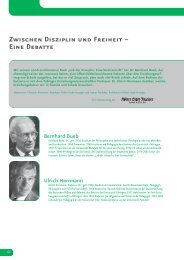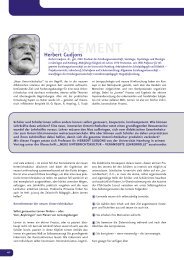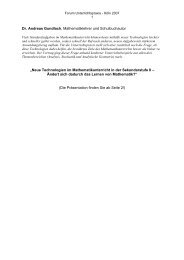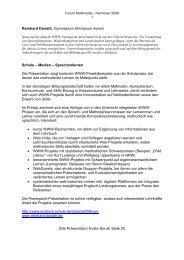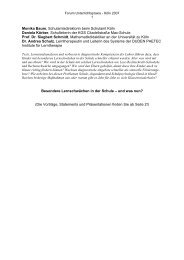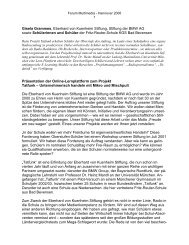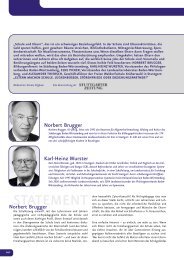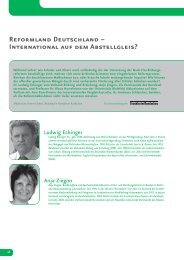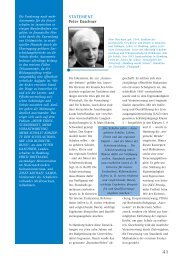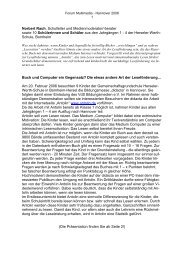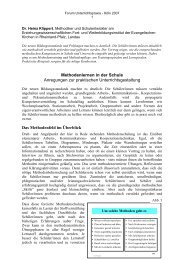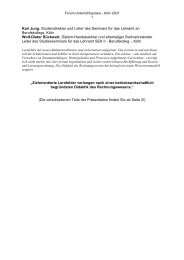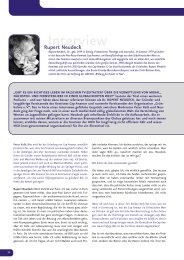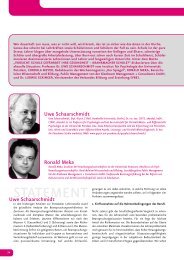Rita Balbi, IRRE Liguria, Italien Carmen Becker, NiLS Hildesheim ...
Rita Balbi, IRRE Liguria, Italien Carmen Becker, NiLS Hildesheim ...
Rita Balbi, IRRE Liguria, Italien Carmen Becker, NiLS Hildesheim ...
Create successful ePaper yourself
Turn your PDF publications into a flip-book with our unique Google optimized e-Paper software.
Forum Multimedia - Hannover 2006<br />
1<br />
<strong>Rita</strong> <strong>Balbi</strong>, <strong>IRRE</strong> <strong>Liguria</strong>, <strong>Italien</strong><br />
<strong>Carmen</strong> <strong>Becker</strong>, <strong>NiLS</strong> <strong>Hildesheim</strong><br />
Kay McMeekin, East Ayrshire Council, Großbritannien<br />
Prof. Dr. Bernd Rüschoff, Universität Duisburg-Essen<br />
Inés Santos, ESEL Leiria, Portugal<br />
David Whybra, Universität <strong>Hildesheim</strong><br />
Europäische Experten des Fremdsprachenunterrichts in der Grundschule diskutierten unter<br />
Bezugnahme auf das Lingua-Projekt „Staging Early Foreign Language Learning“ Einsatz und<br />
Wirksamkeit verschiedener Medien im Englischunterricht der Grundschule.<br />
Weitere Informationen zu dem LINGUA Projekt:<br />
http://www.nibis.de/nli1/europa/index.php?lang=de&MENUE=1&level1=3&level2=0<br />
Inhalte, Methoden und Medien im ergebnis- und standardorientierten<br />
Fremdsprachenunterricht der Grundschule<br />
(Informationen zu der auf Englisch geführten Diskussion finden Sie ab Seite 2!)
Basic issues in Primary English<br />
Summary of a Panel Discussion at Forum Multimedia, didacta 2006<br />
The LINGUA project Staging Early Foreign Language Learning involved the development of<br />
materials for a creative, process-, product-, and communication oriented approach to early foreign<br />
language learning, which places its emphasis on child-appropriate staging and is realistically<br />
oriented towards the learning potential of young target groups.<br />
For everyday use in the classroom it is very important to have a package of teachers’ handbooks<br />
accompanied by CDs with resources for drama activities to develop the children’s fluency in<br />
English as a foreign language.<br />
What characterises the context in which the materials will be used?<br />
To answer this question we shared information about the learners, the teachers and the teaching<br />
of foreign languages in the countries of the participants in the project. The result was a great<br />
variety of organisational situations and an unexpected close convergence of pedagogical trends.<br />
As for the learners, the countries being considered differed regarding the starting age, ranging from<br />
kindergarten age three (Spain) to the third class of primary school (Poland). In Germany, the<br />
starting age varies from six to eight, according to federal state. In Norway six is the starting age,<br />
and also in Portugal many schools offer English from the age of six but it is compulsory only at the<br />
beginning of the third grade (age eight). In Italy a recent reform has lowered the starting age from<br />
eight to six. Only in Scotland does the foreign language start at age nine to ten.<br />
Other differences were the weekly time of exposure including situations with a forty-five minute<br />
lesson per week and those with three fifty-minute ones; the skills considered were just the oral<br />
ones in some countries while others encouraged some limited forms of reading and writing.<br />
In this heterogeneous panorama, however, two common features seemed to emerge very clearly:<br />
the deliverer’s professional profile and the statements about the approach. The deliverer is<br />
generally a primary teacher with an often limited command of the target language and no training<br />
in the teaching of a foreign language at the time of entering the profession. This is often<br />
compensated by strong motivation and an enthusiasm for coping with the challenge of teaching a<br />
subject still perceived as new and different from the others and by special in-service programmes<br />
aiming at the development of the teachers’ communicative and/or methodological competence.<br />
As for the approach, there seemed to be a general consensus as the most frequent statements<br />
about the guiding principles in all the countries concerned were: consideration of the children’s<br />
affective needs and cognitive levels, priority of the oral skills, a content-, resp. topic-based<br />
approach and the involvement of the five senses.<br />
In what terms are the aims of the materials described?<br />
Here it is necessary to make a distinction between direct and indirect users. The first obvious<br />
function of the teachers’ packages is to provide guidance on how to implement the various projects<br />
and also give them the appropriate practical support. Principally they fulfil the former aim and the<br />
latter aim is fulfilled by the CDs of resources to conduct the projects in class.<br />
The other equally important function of the materials is to promote the teachers’ professional<br />
growth along the two lines developed in the materials:<br />
‣ a creative approach to language teaching and<br />
‣ use of the target language as a means of communication with the children.<br />
1
Considering the learners’ language proficiency level, our goals involve the ability to understand the<br />
teacher’s instructions; the ability to understand the gist of the stories, songs, chants and poems<br />
included in the project; the ability to interact in L2 with teacher and peers within the limits of the<br />
tasks and the ability to produce language as required by the various activities.<br />
As for the language content, the projects either introduce or consolidate and extend the functions<br />
and the both active and passive vocabulary of the areas commonly dealt with in primary FLT such<br />
as greetings, self-introductions, invitations, colours, physical description, clothes, food, feelings,<br />
ability, action and movement, typical time and place expressions used in story-telling.<br />
The educational aims focus on the development of the children’s positive self-images, an essential<br />
condition for language learning, as success in this field is “inextricably linked to the way in which<br />
learners experience the classroom: as a place where their weakness will be revealed or where<br />
they feel they are liked and appreciated”.<br />
What kinds of approach are appropriate?<br />
According to our view, staging activities, as part of ordinary classroom life, involve all the children<br />
of a class, regardless of their natural gifts, in both the role of performers and audience alternatively;<br />
in acting out actions, poems and stories the children think about what they are performing and in<br />
this way they are guided to construct “an imagined experience” rather than to struggle to memorise<br />
a part written by someone else. Learning is enhanced by both the perceptive and productive use of<br />
the target language for real purposes in meaningful and enjoyable situations. Staging is a good<br />
way to get children’s whole selves involved with language and it makes the language become<br />
active and real. It forces learners to draw on skills which are essential for out-of-class use of<br />
language.<br />
The use of drama in the foreign language classroom implies that children do their acting for<br />
learning in a pleasant way and not for exhibition, however with the opportunity of acting out their<br />
scenes to the rest of the class as part of the game. This, too, becomes a powerful incentive for the<br />
children to improve the quality of their production, especially in the direction of appropriate stress<br />
and intonation as children want to be understood by their peers.<br />
Performing for an external audience could be a natural development of the work done in class but<br />
it is not the necessary conclusion of our approach.<br />
For further questions on the original project and the planned publication, please contact:<br />
Jens Bolhöfer<br />
Niedersächsisches Landesamt für Lehrerbildung und Schulentwicklung (<strong>NiLS</strong>)<br />
Keßlerstraße 52<br />
31134 <strong>Hildesheim</strong><br />
Germany<br />
Phone: +49-5121-1695-270<br />
Fax: +49-5121-1695-292<br />
bolhoefer@nils.nibis.de<br />
www.nibis.de/nli1/europa<br />
2



